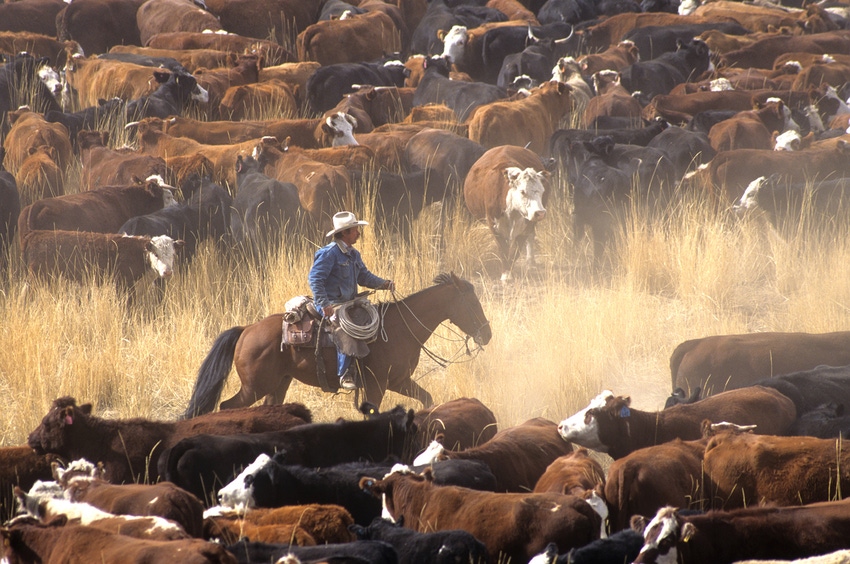Burger King, Cargill, World Wildlife Fund partner on grassland project
Three-year reseeding project will use cattle grazing to restore ecosystem and protect wildlife.
July 1, 2020

As global demand for protein increases, ranchers, agribusinesses, restaurants and conservation partners are coming together to feed a growing population, address climate change and protect the planet. Burger King restaurants and Cargill are teaming up with World Wildlife Fund (WWF) and ranchers within the northern Great Plains to launch a three-year grasslands restoration program.
Through reseeding, the program aims to convert nearly 8,000 acres of marginal cropland throughout Montana and South Dakota to ecologically diverse grasslands with beef cattle as the primary grazers in the ecosystem to maintain it. If successful, the program is projected to save the carbon equivalent of driving nearly 70 million miles in an average passenger vehicle.
“We recognize the powerful opportunities we have to advance sustainability in food production together. Through our parent company’s Restaurant Brands for Good framework, we have showcased our commitment to implementing more sustainable business practices,” said Matthew Banton, global head of innovation and sustainability for Burger King. “Via the Grasslands Restoration project, we are proactively engaging with our peers, experts and industry stakeholders to help advance beef sustainability and mitigate the effects of climate change.”
According the U.N. Food & Agriculture Organization, the North American beef supply chain is already more than 35% more efficient from a greenhouse gas perspective than the global average. The project builds on the strong leadership of farmers and ranchers in this region by providing additional opportunities to expand their grazing land.
Climate benefits of reseeding, cattle grazing
The reseeding efforts will focus on large areas of marginal cropland in the northern Great Plains, where the land is not productive for farming or other agricultural uses. Native grasses, with roots 10-15 ft. deep in some cases, pull carbon from the atmosphere and store it underground to support one of the world’s most stable carbon sinks. The roots also secure the plants and topsoil from being blown or washed away and effectively pull water underground, supporting the resiliency of the grasslands during times of drought.
“Through this project, the producers recognize the potential to improve the ranches for future generations,” South Dakota rancher Markus Erk said. “I’m thrilled to team up with partners who want to come along side us to help us enhance our conservation practices.”
When managed well, cattle grazing can help stimulate the growth of grasses and maintain a healthy ecosystem, similar to the role the region’s native bison used to play. Cattle’s hooves break through hard ground, allowing more water to be absorbed into the soil. The restored grassland can also provide a habitat to wildlife unique to the region.
“Ranchers are some of the most important stewards of the grasslands of the northern Great Plains. As managers of over 70% of the remaining intact grasslands within this region, they hold the key to its future,” said Martha Kauffman, managing director of WWF’s Northern Great Plains program. “Our collaboration with Cargill and Burger King will restore formerly plowed areas within these vital ecosystems back to grasslands through the seeding of native grasses. As these ecosystems rebuild under the management of our ranching partners, the environmental value and the health of our grasslands, including their ability to support wildlife, will continue to grow for years to come.”
The latest monitoring practices will be used to measure the progress of the project, including changes in soil carbon and moisture, and the wildlife response. Carbon measurement tools will also be explored and tested to continuously evolve best practices.
Progress through partnerships
The project is part of Burger King’s and Cargill’s continued efforts to help make beef more sustainable.
As one of Restaurant Brands International's iconic brands, Burger King is working to advance the commitments made through its sustainability framework, Restaurants Brands for Good.
Cargill’s BeefUp Sustainability initiative, launched last year, seeks to reduce greenhouse gas emissions throughout the company’s beef supply chain 30% by 2030, measured on a per pound of beef basis against a 2017 baseline.
Efforts by both companies support the U.N. Sustainable Development Goals.
Cattle ranchers will be at the forefront of this effort to develop a foundation for ecosystem restoration that encourages increased participation as the program grows. The collaboration also builds on WWF’s existing Sustainable Ranching Initiative, further expanding the opportunity for ranchers to implement sustainable cattle grazing practices after plants have had time to root.
“We are building on the strong environmental stewardship led by farmers and ranchers and will partner with producers, customers and innovators to drive sustainability solutions,” said Heather Tansey, sustainability lead for Cargill’s protein and animal health businesses. “At Cargill, we are in a unique position to drive connection across the entire North American beef supply chain. Together, we can scale realistic solutions that address sustainability challenges.”
You May Also Like



